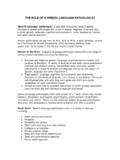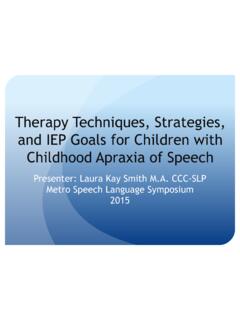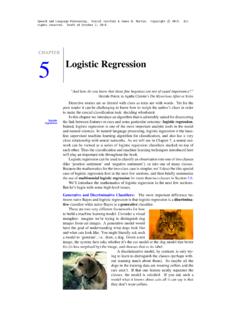Transcription of A Parent's Guide To Home Reinforcement - Speech Buddies
1 A Parent s Guide To: Home Reinforcement How to Support Your Child in Speech Therapy CONTENT !1. Introduction 10 Warning Signs Of A Speech Disorder In Your Child 3 Will My Child Outgrow His Speech Challenge? 4 !2. Parent Involvement How To Develop Correct Speech Habits At Home 6 7 Ways To Build Confidence In Kids With Speech Disorders 8 Make Speech Therapy Goals 10 Tips For Keeping Your Child Motivated to Achieve His Speech Goals 11 !3. At Home Activities Speech Therapy Exercises For Children 13 5 Ways To Use Technology For Speech Therapy At Home 15 Look For Proven Specific Tools: Speech Buddies 16 !21. Introduction10 Warning Signs Of A Speech Disorder In Your ChildWhat exactly is a Speech disorder?
2 !According the American Speech - language -Hearing Association, a Speech disorder is when a person is unable to produce Speech sounds correctly or fluently, or where normal Speech is disrupted. Articulation disorders, Speech impediment, and stuttering are examples of Speech disorders. Both adults and children can suffer from Speech disorders and they can occur as a result of a medical problem or have no known cause. Speech disorders involve difficulty in producing certain sounds such as s or r . As your child matures, his or her Speech pattern should become more understandable and generally, he should be speaking clearly by the age of e i g h t.
3 W h i l e a l l children develop at different rates, it s important to ensure t h a t y o u r c h i l d i s showing continuous language growth and progression. Depending on the specific Speech condition of your child symptoms can vary, but there are some essential signs t hat every parent should wa t c h f o r a s t h e i r children grow and develop. !10 Communication Milestones ! child does not interact socially starting in infancy does not follow or understand what you say (starting at 1 year) says only a few sounds, words, or gestures (18 months to 2 years) words are not easily understood (18 months to 2 years) does not combine words (starting at 2 years) has a limited vocabulary (age 2-3 years) says p, b, m, h, and w incorrectly in words (1-2 years) says k, g, f, t, d, and n incorrectly in words (2-3 years) produces Speech that is unclear, even to familiar people (2-3 years) is not using 2-3 word sentences to ask for things (by 3 years)
4 If you think your child is exhibiting any of these warnings signs of Speech disorder, it s important to seek the advice of a pediatrician or Speech language therapist. Early intervention is the key to prevention and elimination of a Speech disorder at any age. For additional detailed information, The National Institute on Deafness and Other Communication Disorders (NIDCD) has an online checklist available for parents who are concerned about their children s Speech and communication development.!3 This question not only nags at all parents who are faced with addressing a child s Speech challenge, but is one that Speech - language pathologists (SLPs) must seriously consider before beginning treatment.
5 This chapter aims to shed some light on this often murky question and to arm you with better information so that you may be more informed partners in the treatment decision-making process. !The three most important factors, in general order of importance, f o r d e t e r m i n i n g w h e t h e r a Speech challenge is likely or unlikely to spontaneously correct are the age of the child, severity of the child s Speech challenge, and a child s and/or his family history of a Speech challenge. The SLP must carefully weigh each factor, often in conjunction with a Speech screening or full evaluation, to come up with a more definitive decision on whether to proceed with therapy.
6 !1. How old is your child? ! Speech is the most complex thing we humans do on a daily basis, from a motoric, movement-based standpoint. Therefore, it shouldn t be surprising that it can take time for the average child to develop accurate, fluent Speech . Perhaps the first question SLPs ask of a parent who contacts them is: how old is your child? In reality, certain misarticulations a r e , i n f a c t , n o r m a l . F o r example, it is normal for a three-year old to say wock for rock . Should that child continue to substitute /w/ for /r/ at age seven, that would almost certainly be something that should be clinically addressed.
7 But, this question of age of the child represents a bit of a balancing act. Research c o n t i n u e s t o r e v e a l t h a t intervening early is absolutely key. Yet we wouldn t want to intervene in a case where the child would spontaneously correct his errors ( grow out of it ). If there s any doubt regarding this question of age with a particular Speech error, the next thing SLPs do is look at the child s overall level of Speech intelligibility and how many different Speech sounds he is having trouble with. !2. How severe is the Speech challenge? !Let s assume a misarticulated /r/is the only sound a child is Will My Child Outgrow His Speech Challenge?
8 Three Factors Determine if a Speech Challenge Can Be Outgrown!4having difficulty with. This would very likely represent a mild articulation disorder. Typically, an SLP will adopt a wait and see approach if t h a t c h i l d i s s t i l l i n k i n d e r g a r t e n o r b e l o w. However, with every six month period with no self-correction, the SLP will be more likely to recommend treatment. If that s a m e k i n d e r g a r t n e r h a s difficulty with /s/, /sh/, in addition to the /r/, the SLP would be much more likely to recommend treatment as soon as possible. !3. What is the family history of Speech challenges?
9 !The next consideration that certainly goes hand in hand with the severity of a child s misarticulations is whether that child has had a history of Speech errors and/or Speech therapy or if Speech errors run in that child s family. If a child was seen by an SLP at age three to treat, for example, misarticulated /k, g, v, f/, then it is considerably more likely that a misarticulated /s/ or /r/ at age five will also require treatment. In these cases, especially with /s/, an SLP will sometimes bump down his age threshold for treatment to 4 years. Since, there is a strong genetic connection in Speech challenges.
10 !If an older sibling or parent had therapy, SLPs tend to address a child s Speech challenges a little earlier than they normally would when no family history of Speech challenges is present. !A full Speech evaluation by a licensed SLP is t he most definitive answer to whether a child may outgrow his Speech challenge. However, many parents may not need to go to those lengths to get a better sense of where their child s Speech stands. Age, severity and child/family history of Speech challenges are all highly significant factors in d e t e r m i n i n g w h e t h e r t o intervene at a given juncture.








